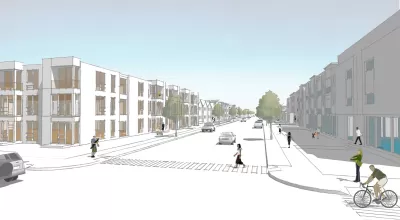A recent study surveyed 800 jurisdictions in 50 U.S. metropolitan areas to quantify the amount of change in zoning regulations throughout the 21st century so far.

Research published in June by the Journal of the American Planning Association examined zoning changes in major U.S. metropolitan areas from 2003 to 2019, finding that zoning grew more accommodating to apartments in strong-market metro areas over that time period.
In addition to the abstract, which is available online, the researchers—Rolf Pendall, Lydia Lo, and Jake Wehmann—provide this "takeaway for practice":
Local land use planners in the United States have ethical and legal obligations to undo the racial segregation designed into zoning from its founding. They also must prepare for continued population growth. Tools and strategies exist to do both of these, and some planners have the commitment and political space to use them. In other places, planners and their professional organizations need to change rules within their own communities and advocate for state legislative reforms so that planning works predictably to unwind unequal and exclusionary settlement patterns within neighborhoods and cities.
The study's abstract suggests that the findings function as a counter-narrative to opinions of pundits and economists that zoning explains housing price inflation in fast-growth metro areas. This research shows the limitation fo the narrative, according to the authors.
For more of the ongoing debate about zoning's role in the housing market, and attempts by local jurisdiction to create more affordable housing supply by loosening zoning restrictions on multi-family housing, see the collection of articles flied under Planetizen's Zoning Reform tag.
The article's abstract and a link to the (paywalled) study is available below. To access some of the research without a paywall, see also a follow up brief built on the original study, recently published by the Urban Institute and written by Patrick Spauster, Lydia Lo, and Yonah Freemark.
FULL STORY: Shifts Toward the Extremes

Montreal Mall to Become 6,000 Housing Units
Place Versailles will be transformed into a mixed-use complex over the next 25 years.

Planetizen Federal Action Tracker
A weekly monitor of how Trump’s orders and actions are impacting planners and planning in America.

DARTSpace Platform Streamlines Dallas TOD Application Process
The Dallas transit agency hopes a shorter permitting timeline will boost transit-oriented development around rail stations.

Without International Immigrants, the Rural US Population Would Be Falling 58%
Census data shows that population growth in rural areas is due in large part to international migrants.

Dead End: Nine Highways Ready for Retirement
The Freeways Without Futures report describes the nation’s most promising highway removal proposals.

Congressman Proposes Bill to Rename DC Metro “Trump Train”
The Make Autorail Great Again Act would withhold federal funding to the system until the Washington Metropolitan Area Transit Authority (WMATA), rebrands as the Washington Metropolitan Authority for Greater Access (WMAGA).
Urban Design for Planners 1: Software Tools
This six-course series explores essential urban design concepts using open source software and equips planners with the tools they need to participate fully in the urban design process.
Planning for Universal Design
Learn the tools for implementing Universal Design in planning regulations.
City of Mt Shasta
City of Camden Redevelopment Agency
City of Astoria
Transportation Research & Education Center (TREC) at Portland State University
City of Camden Redevelopment Agency
Municipality of Princeton (NJ)
Regional Transportation Commission of Southern Nevada





























